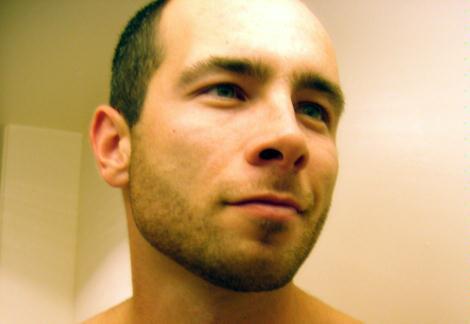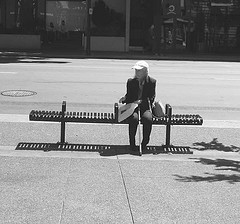Rocky crags littered the coast lines. The rocks were worn, discolored, and suited no purpose but fending off the large vessels that tried to settle this wasteland upon its discovery in 1497.
I was a lonely child. I would sit upon the shores while the other kids were out biking together and playing guns; I would become one with the ocean. I would smells its salts, watch its movements, and take in the water and its surroundings as if I were mapping it out in my mind.
Along the coasts of Newfoundland you can smell the sea salt miles away. The humidity in the air would spread the familiar stench throughout the community. It would also spread the salts to our vehicles and homes, and after a few years, corrosion would set it. Most everything rusted after time, the bottoms of cars would be eaten away; the windows and siding on houses would turn brown and rot. Even the faces of people couldn’t resist the elements; aging set in quicker, and although salt is usually a preservative, it would deteriorate the living.
The crippled coast line had little aquatic life. The sea barnacles would attach themselves to the crags and build up mountains of white, crusted life. The marine life consisted of scopies, rock cod, shrimp, lobster, and the occasional jellyfish plotting they way along the shore. We could pick mussels and cook them during the summer months – provided the ocean was clean of red tide.
There were four seasons in Newfoundland; this is a long withstanding joke, but a truthful one nonetheless: winter, still winter, almost winter and construction.
In the summer, instead of a barren wasteland of snow, there were barren wastelands of bog. Up behind my house, there was a trail, forged so long ago by my ancestors, which led the way to the bogs that surrounded most of Newfoundland.
In order to get there, I had to pass behind my grandfather’s hotel, and trek for some time through the rocky and sandy trails. There were two large hedges of weedy trees, thinking back, I remember calling them alders, but I am not sure what the appropriate name would be.
There was nothing special about the bogs. They grew bakeapples (or cloudberries to some), blue berries, pitcher plants, marsh berries, and was a breeding ground for black flies and mosquitoes. In the summer clouds of black flies would torment us. Camping, although plentiful in these areas, was discouraged during certain times because of the abundance of biting insects.
I was a lonely child, and I would go to the bog for refuge. I would sometimes grab a gallon bucket and pick berries for my mother. I would fill her in on my expedition and tell her I would grab some bakeapples for her, and with that said, she would run for the bucket.
The bog was so barren the only things that lived on it, or inhabited it at times, were black bears. I think there was a dump nearby and the bears would forge these areas for berries. Most of the bog was acidic though, not even pine trees would grow there; if they did they would only be stumps and would only grow a few years before their bark turned white and started rotting.
About 20 minutes of hiking would bring me to a solitary lake. Nothing surrounded it, and it was like an oasis in a desert. The lake would reflect the sun beating down from the blue sky above; all that surrounded it was the brown, orange, and red boglands, no trees, no life, just berries as far as the eye can see.
Sometimes when I sat around the lake, a pool of water with no life, and I would hear the call of a bear or moose. It was the single to pack up and leave. A bear could easily out run a person if the need arose, and because their food sources were limited, I wouldn’t put anything pass them.
The winters here would transform the bog into a ski-doers paradise. There were many intersections and roads, the plows would smooth out most of the main routes with a small donation from community members. And, after school, the bogs, and most of the community, was transformed into a very unique transportation system. Everyone had a ski-doo, and if they didn’t, they would find a friend who would take them out.
Most of the road systems that we had would be covered in snow, so taking the snow mobile out would be the sensible option to getting around. Gas stations would be lined with motorists, people would go to grocery stores on ski-doors, to the liquor stores, and as you make your commute on the ocean or lakes, groups of five or more people would have their snow mobiles parked together having a yarn or scoff (a talk).
This was not a men’s only environment. All walks of life would be out around; bankers, teachers, fish plant workers would all be out, they are equal, and the only thing that separates the middle class from the working poor are the quality of your ski-doo and the type of dress. Women would float by, their hair done, make-up applied, speeding down the trails just like everyone else.
After a long day of ski-dooing we would head in, with our hands nearly frost bitten, our noses red from the cold, and would relish in the front of warm air as we barged into our home. Our mother would be waiting, smiling, and asking if we were cold. We would sit down and have a cup of coffee and home made bread to set us right.
One winter, I’m guessing because of the harsh cold, the arm (Inland Ocean) had frozen over, and seals were making there way down to the shores on ice sheets. Driving along the loop where we lived, we could see one or two battered seals strewn out on the ice-laden shores. Their blood would soak the white snow, their pelts dirty and unkempt, and someone in our small community ended their life, just because they could. The seals were a harmless nuisance.
The occasional polar bear would find its way down also and the communities affected would be put on alert. They weight a ton, are very wild, and if they want to get into a home, they will. Most polar bears that found there way down to the coast were shot on site unless an animal rights activist found them first.
It’s a raw environment. There were no wal-marts, sport checks; commercialism never existed until I moved into the city at 17. If we were bored, we would go on hikes, explore nature, or hang out with friends and play some sort of sport. I still don’t understand the need for people to shop; I don’t understand the need for people to surround themselves with this ideal accumulation. I don’t understand television, being idle, or complaining about life. I understand the simple things, and although I live in a moderately large city, I think the life I had, shaped the life I have now.




